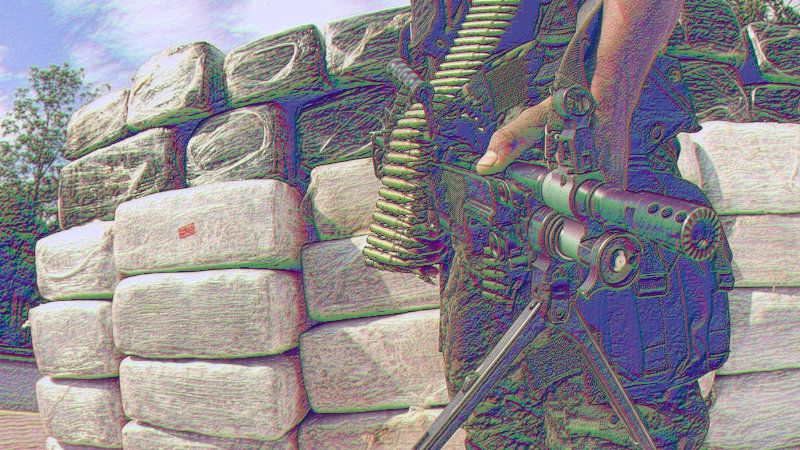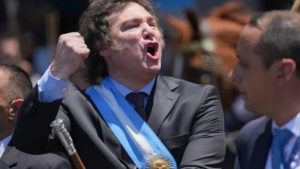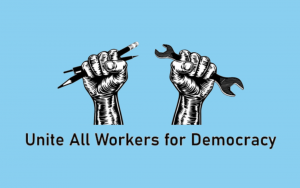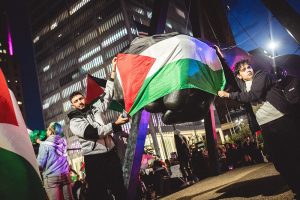The level of violence across Mexico involving drug traffickers and the armed forces has become the subject of considerable controversy and much debate. The right-wing opposition and the government are both weighing in, as are analysts and independent investigative journalists. Every week, it seems there is a new event highlighting just how serious the situation has become in several states that are the weakest links in a panorama that extends to most of the national territory. It’s reminiscent of what Mexico experienced during the presidency of Felipe Calderón from 2006 to 2012.
While it is difficult to cull from official statistics which violence is linked directly to drug trafficking, an estimate is possible if we consider, for example, that of the more than 2,000 murders that occurred in Mexico in January 2022, Guanajuato, Michoacán, and Zacatecas — three of the states with the greatest cartel activity — are also among the states with the highest number of violent deaths.
Journalists in particular face a dramatic situation. So far this year, six journalists have been murdered. Journalists in Mexico face conditions of danger and defenselessness that are similar to those in a war zone — something the international media has already pointed out, and that the European Parliament has opportunistically tried to take advantage of as it approves censure motions against the press in its own countries.
As we have written in other articles, it is journalists and women — with an increase of femicides to more than 10 a day — who suffer the most from the consequences of Mexico’s political and social decomposition.
From “Return the Army to Their Barracks” to the National Guard
The government of Andrés Manuel López Obrador (AMLO) campaigned in 2012 and 2018 on a pledge that he would return the army to their barracks. This stance won him a lot of approval after the tremendous social protests of the preceding decade, especially against militarization, by democratic movements such as the Movement for Peace with Justice and Dignity and the movement for Ayotzinapa.1Translator’s note: Movimiento por la Paz con Justicia y Dignidad, the Mexican Idignados Movement, is a protest movement that began in March 2011 against the Mexican drug war, government and corporate corruption, and economic policies that have expanded inequality and poverty. The Ayotzinapa movement is a reference to the abduction and murder of 43 students from the Ayotzinapa Rural Teachers’ College who were on their way to Mexico City to commemorate the 1968 Tlatelolco massacre. Police were charged, and there have been allegations of the government covering up the involvement of an infantry battalion of the Mexican Army. The government claimed drug cartels were responsible for the killings.
After AMLO won the election, though, his promises gave way to an opposite policy. The National Peace and Security Plan, released in November 2018, made it clear that AMLO’s aim was to put security and the fight against drug trafficking under the direct responsibility of the military. For this purpose, he created the National Guard, with members from the Navy and the Army, through a process that went through several iterations — including a debate on whether it would be under military or civilian command. It culminated in the new body being assigned to Mexico’s Secretariat of National Defense (SEDENA) and an ironclad centralization of internal security within the armed forces. The government also began to include the armed forces in civilian tasks and aspects of its political agenda, including having the armed forces participate in the administration of ports and customs as well as various social programs, including building up the Banco de Bienestar and helping construct a new airport.2Translator’s note: Banco de Bienestar is a program of AMLO to establish an institution charged with distributing social welfare resources across Mexico Building a new airport for Mexico City, some 27 miles from the city center and the current airport, is a centerpiece of AMLO’s infrastructure program. All of this has meant deepening Mexico’s militarization by giving the armed forces a greater role in security and in various areas of society.
As one researcher has written,
During the transition period, López Obrador and his team maintained their commitment to a new pacification strategy. In addition to including a package of social policies focused on youth in particular, this strategy contemplated changes in drug regulation policies, as well as a battery of alternative penalties and amnesties. Although many of these proposals were well received by public opinion, it was not easy to know whether they would be compatible with Washington’s security priorities, let alone to anticipate their viability in the context of the insecurity and violence engulfing the country.
Indeed, since AMLO became president, his orientation with respect to security and drug policy has always been largely in accordance with whatever is dictated by the White House — first from Republican Donald Trump and then from Democrat Joe Biden, without much change from one to the other. Although AMLO has on numerous occasions used the phrase “hugs, not bullets” to summarize his policy in these areas, and claims to be attacking the social causes of violence, the truth is that the National Guard has 170,000 troops (more than ever were deployed by Calderón) and is doing nothing to attack the root causes of poverty, inequality, and social marginalization.
Following in the footsteps of previous neoliberal governments, AMLO justifies militarization to the Mexican people as the necessary response to drug trafficking. The primary work of the National Guard, though, has been to repress migrant caravans and social movements as its territorial presence and its image and strength as part of the state apparatus grows in the eyes of working people. The proof of this can be seen it its repeated operations against migrants beginning in 2020, the Ayotzinapa students, and the teachers of Michoacán in the first months of this year.3Translator’s note: Unionized teachers in the Mexican state of Michoacán mounted massive protests, including road and rail blockades, after refusing to participate in virtual and physical classes when payments of their wages were halted. The demonstrations were repressed by the National Guard. The actions it has taken against organized crime and the drug cartels are a matter of much controversy and debate.
The Government’s Strategy Against the Cartels
A number of journalists and researchers have argued that the strategy of “hugs, not bullets,” rather than using social policy to undermine the drug cartels, actually protects a policy aimed at avoiding any direct confrontation with the cartels — a kind of “unsigned agreement” — so as not to repeat what was experienced in previous presidencies. El Pais columnist Jorge Zepeda Paterson, for example, has written, “The president concluded that given the real impossibility of facing the problem, it was better to buy some time — a strategy that could not be admitted to publicly, and that was politically incorrect, but was, in his opinion, realistic.” Thus, the actions of the National Guard, in addition to guaranteeing militarization, would be aimed at recovering territorial control in the 248 districts into which Mexico was divided for security purposes, without looking for direct confrontations with the cartels, but rather to show more of a presence. This has been accompanied with greater “financial intelligence” to interfere, if necessary with the economic operations of some of the cartels.
This approach has not achieved its objectives, and now we face this spiraling violence thanks to the expansion of some cartels and more confrontations between them — which has played out over the last two years in the form of thousands of violent, barbaric episodes. One of the most notorious occurred in Culiacán in October 2019. There was a violent response to the government operation to arrest Ovidio Guzmán López, son of Joaquín “Chapo” Guzmán and a known member of the Sinaloa Cartel. The cartel shut down access to the state capital — a demonstration of its armed power that compelled the government to agree to release the drug lord. Another example is the attack against Omar Garcia Harfuch, Mexico City’s Secretary of Public Security, in June 2020. It took place in broad daylight in a well-off area of the city. Members of the Jalisco Cartel – New Generation used high-powered weapons and showed logistical capabilities.
AMLO’s detractors — many of whom belong to or identify with the right-wing opposition parties — criticize the president, saying that behind the “hugs, not bullets” line is a decision not to act against the cartels, showing the state to be weak. Sectors of imperialism itself — such as former U.S. prosecutor Barry Carr — argue that the government has lost sovereignty over the cartels and that its strategy is now to “coexist with the cartels.”
All of them demand a head-on fight against drug trafficking; that is, a return to the policy carried out by the governments of Calderón and Enrique Peña Nieto, the president who preceded AMLO. They want the National Guard – in addition to the militarization and repression against social movements that the AMLO government has fostered — to go on the offensive against the cartels instead of being limited to some sort of containment of drug trafficking. The Biden administration seems to be calling for the same thing.
Expansion and Fragmentation: The Current Reality of Drug Trafficking
Part of the increase in generalized violence must be attributed to this deepening of militarization through the actions of the National Guard, which constitutes the genuine realpolitik of what AMLO has called the Fourth Transformation of Mexico — his 2018 campaign promise to end the “privileged abuses” of high government officials in the country. Human rights violations are widely documented, and the presence of the different armed bodies in the streets (whether the police, the Armed Forces themselves, or the militarized National Guard) has had dire consequences for the population, from intimidation to repression.
In addition, the dynamics of the drug trafficking business in Mexico in recent years must certainly be considered as fundamental to the increase in violence. Today, there are at least 16 cartels in Mexico spread unevenly throughout the 32 states. This expansion has been consolidated during AMLO’s administration. Two cartels, present in 25 of the states, are at the forefront. One is the historic Sinaloa Cartel. The capture and extradition of “Chapo” Guzmán to the United States did nothing to eliminate the cartel; instead, its different factions are led today by a number of his relatives and by Ismael “El Mayo” Zambada, who has miraculously evaded capture for more than 30 years. Its base of operations is concentrated in the so-called “Golden Triangle” and the northern states of the country, strategically located near the U.S. border. But it has a presence, either directly or through shaky alliances, in most of the republic.
The other is the Jalisco Cartel – New Generation (CJNG), which rose meteorically in recent years under the leadership of Nemesio “El Mencho” Oseguera. It has employed a very aggressive expansion strategy, with alliances and clashes with other cartels and organized crime groups. The CJNG is now present in more states than all of its competitors. Some analysts compare it to the Los Zetas cartel, particularly for its paramilitary style and propaganda, with its forces dressing and parading as if they were a regular military force as they openly defy state control.
With so many large organizations, smaller groups, and cells, as well as the alliances that quickly give way to confrontations for the control of the plazas, the struggle between cartels plays out in a complex and intricate manner. Wars break out between them and government forces, as we’ve seen in most states, including Guanajuato, Michoacán, Zacatecas, and a long list of others. One of the most recent chapters in this saga was the collective executions in San Jose de Gracia.4Translator’s note: On February 27, a dozen men attending a funeral in the town of San Jose de Gracia, Michoacán, were lined up against a wall and executed by drug cartel hitmen. The funeral service was for the mother of an alleged hitman who had worked for the Jalisco cartel.
It is important to keep in mind that the different cartels, in pursuing their economic interests and quest for profit through illegal means, are not limited to drug trafficking. Increasingly, they have been getting into other lines of “business,” including kidnapping, extortion, fuel theft from pipelines, collecting “protection” payments, and human trafficking. As is well known, many migrants have been the victims of cartel kidnappings and murders. The cartels have also been intimidating lemon and avocado farmers and loggers in Michoacán and Guerrero for “protection” payments; this also facilitates subsequent efforts by narcotics cops and transnational mining companies to carry out their megaprojects.
Drug trafficking activities — particularly by the two leading cartels — have become increasingly internationalized, extending their links to countries in Europe, Asia, and Africa, while they have become the main suppliers of cocaine, methamphetamine, and fentanyl consumed in the United States. The production and trafficking of synthetic drugs such as fentanyl, with much higher profit margins than other drugs, really stands out; fentanyl is made from ingredients that come from China. Thus, the cartels are fighting for control of the routes to Mexico and from Mexico to the United States, which is why the airports have become so strategically important, along with the country’s main ports in the states of Michoacán, Colima, and Veracruz.
A recent investigation by Contralínea magazine highlights the criminal enterprise networks shared by the two main cartels in Mexico, which combines a federated network with a highly hierarchical structure that has branched out into an array of criminal activities and to various countries and continents. The character of this business is explained by “its ultimate goal: commercial dominance in one or several criminal economies. In all cases, the source of power is the accumulation of economic capital around these markets, which is used to exert increasing amounts of social and political power over their areas of influence.”
Again, it is important to consider the actions of the drug cartels in light of their search for profits through activities that are not simply illegal, but are the greatest expression of the decomposition and social degradation of Mexican capitalism. These include human trafficking and extortion, to mention only two.
There are various aspects to the relationship between the state and drug trafficking. Many speak in terms of infiltration, but the reality is one of genuine collusion and criminal association between different levels of the state and institutions and the different cartels. One of the most scandalous expressions of this was the relationship between Genaro García Luna, Mexico’s Secretary of Public Security from 2006 to 2012, and the Sinaloa Cartel.5Translator’s note: In July 2020, Luna was indicted in U.S. federal court with engaging in a continuing criminal enterprise — specifically, that along with other high-ranking Mexican law enforcement officials who worked under him (and who were charged with cocaine trafficking conspiracy), Luna permitted the Sinaloa Cartel to operate with impunity in Mexico. Luna was arrested by U.S. federal agents in Dallas on December 9, 2019; his trial is set to begin in October 2022. Only someone looking at this naïvely (or with self-interest) could pretend that it all ended in 2018 or that such corruption is found only at the lowest levels of the police forces and local authorities. That is far from reality; as history shows, it has reached the highest levels of the capitalist state, and drug trafficking has a direct influence on the appointment of political and police officials.
Similarly, corruption and criminality are not exclusive to this or that political party. All the political forces that represent Mexican business interests are, to a greater or lesser extent, involved. Investigative journalist Ricardo Ravelo, in his most recent book Los narcopolíticos (Narco-politicians) shows the evidence of corruption belonging to all the parties in the highest spheres of government.6Ricardo Ravelo, Los narcopolíticos (Mexico City: Harper Collins México, 2021). Of course, he was threatened with legal action by the current governor of Jalisco, Enrique Alfaro, whose party is the Movimiento Ciudadano (Citizen’s Movement). Along with the huge number of officials from the PAN and PRI, quite a few governors and mayors belonging to MORENA have also been singled out in different states of the country governed by the ruling party.7Translator’s note: Partido Acción Nacional (PAN, National Action Party) is a conservative political party in Mexico founded in 1939; its recent presidents include Vicente Fox (2000–2006) and Felipe Calderón (2006–2012). Partido Revolucionario Institucional (PRI, Institutional Revolutionary Party) held uninterrupted power in Mexico from 1929 to 2000 (under the PRI name from 1946); PRI president Enrique Peña Nieto preceded AMLO in power (2012–2018). The Movimiento Regeneracíon Nacional (MORENA, National Regeneration Movement) is AMLO’s party.
The actions and expansion of the cartels cannot be explained without their close relationship with the so-called political class and the different levels of the state and the armed forces. This worked particularly well for the political parties involved when there was a hegemonic cartel — as in the 1980s, with the so-called Federacíon (Federation) created by “godfather” Miguel Angel Felix Gallardo, which enjoyed a privileged relationship with various U.S. agencies that became public with the Iran–Contra scandal.8Translator’s note: During the second term of the U.S. administration of President Ronald Reagan, it was revealed that senior officials in the U.S. government had secretly helped arms sales to the Khomeini government of Iran — while there was an international arms embargo in place — with the aim of using the proceeds to fund the so-called Contras in Nicaragua, the name given to the various U.S. backed and funded right-wing groups waging a war against the Sandinista government after the 1979 revolution. Evidence came out later that Gallardo had told people that he believed his drug trafficking operation was safe because he was supplying arms to the Contras on behalf of the United States. The relationships were also used to tip the balance toward one of the contending cartels, as with Luna and his association with the Sinaloa Cartel. At the same time, when there was a lot of fragmentation or competition became especially tough, the state’s choice — whether at the level of the central or regional government, or even locally — to protect this or that cartel and guarantee its position led to reactions and confrontations that were quite violent, as was seen under previous presidential administrations and is currently happening in many Mexican states. It is the local populations that always suffer the consequences of these confrontations between cartels and with the armed forces.
Today, some point out that the state’s efforts are concentrated primarily against the Jalisco Cartel – New Generation, which thus favors its main competitor. Others defend the official strategy, arguing that it is simply a reflection of the CJNG’s greater aggressiveness.
The links between drug trafficking and the institutions and political parties at the service of big business and military forces signal that we are confronting a fundamental characteristic of Mexican capitalism. In light of oppression at the hands of imperialism and its acceptance of Washington’s prohibitionist drug policies, Mexico has rolled out a profound degradation and decomposition of every aspect of so-called public life.
The United States and AMLO’s Security Policy
This is the context for the U.S. administration’s call for more decisive action against drug cartels by the Mexican government. The U.S. State Department, in its recent “International Narcotics Control Strategy Report (INCSR) 2022,” argues that Mexico has little capacity to prosecute money laundering, that the chemicals used in narcotics production are not regulated, and that Mexican cartels are playing an increasingly transnationalized role as a production and transit point to the United States and in relation to Chinese chemical ingredients.
The Biden administration made the decision to point out openly the influence drug trafficking organizations wield over high-level Mexican government officials. This undoubtedly aggressive gesture was combined with a call to “continue to work together to intensify efforts to dismantle transnational criminal organizations and their networks, increase prosecutions of criminal leaders and facilitators, and strengthen efforts to seize illicit assets.” It is important to keep in mind that these remarks were preceded by the indictment of Genaro García Luna and the detention of General Cienfuegos, who was finally released following the diplomatic protest of AMLO’s government.9Translator’s note: Retired General Salvador Cienfuegos Zepeda, who served as Mexico’s Secretary of National Defense from 2012 to 2018, was arrested by U.S. law enforcement at Los Angeles International Airport in October 2020 and was accused of aiding the H-2 Cartel in moving thousands of tons of narcotics in exchange for bribes. The U.S. Department of Justice (DOJ) also stated that Cienfuegos was the high-ranking Mexican government official known as “The Godfather” who was central to using the Mexican state to aid drug traffickers. The DOJ, under Attorney General William Barr, agreed to the extradition based on promises that Cienfuegos would be prosecuted in Mexico, but in in January 2021, Mexico’s attorney general announced the retired general would not be charged, a decision AMLO endorsed.
Now it appears that the White House is particularly concerned about the boom in production and trafficking of synthetic drugs such as fentanyl to the United States. Washington is expecting more intense activity by the AMLO administration against the cartels operating in the United States, and “greater collaboration” — which can only mean greater involvement by the U.S. Drug Enforcement Administration. U.S. pressure, although presented in a diplomatic manner — as part of its U.S. interventionist policies — is evident, and will only lead to even greater militarization of Mexico and the northern border.
It remains to be seen whether AMLO will accede to U.S. expectations — meaning a stronger confrontation with the cartels, which would create greater instability and comes with political costs for the government, considering the societal sensitivity to violence in the country. He may keep on his current course, focused on maintaining state presence in the hottest areas by means of the National Guard, which — again — is most “effective” against social protest.
In recent weeks, we have seen the arrest of several leaders, such as the apprehension and deportation to the United States of “El Huevo” Treviño, capo of the Northwest Cartel and nephew of the fearsome Z-40, as well as the regional leader of the CJNG in Colima. These could be interpreted as gestures aimed at calming U.S. anxieties and demands. And it comes in the context of new actions by organized crime, such as the murder of the mayor of Aguililla, a town in Michoacán where the armed forces had taken back the municipality from the cartels. That had been touted as a positive expression of the government’s policy of greater territorial presence.
The current situation is creating tremendous instability. And it can be dangerous for a government that seeks, precisely, to preserve a certain political stability so that it can make it to the 2024 presidential elections with its current level of popularity and keep the right-wing opposition from capitalizing on the situation through calls for greater “security.”
AMLO’s security policy, part of his “Fourth Transformation,” is fully aligned with the subordination of Mexico that Washington demands. It is based on the prohibitionist drug policy and the deployment of the armed forces throughout Mexico.
In past years, the so-called war against drug trafficking and the militarization that supported it brought disastrous consequences for Mexico’s workers and impoverished people: a shocking toll of hundreds of thousands of deaths and tens of thousands disappeared and displaced. This was the most abhorrent expression of the consequences of economic, political, and security subordination to the United States, as well as of the decomposition and degradation that has resulted from the historical oppression of Mexico by imperialism — which shares a 3,000-kilometer border with the colossus to the north — and the most recent policies imposed by the White House.
It is clear that the only way out of the current trap, crisscrossed by the actions of the cartels and the Mexican state’s security strategy, necessarily involves breaking with imperialism and its dictates. Demilitarizing the country, legalizing drugs, and expropriating drug capital are fundamental measures that must be taken. This is far from what the political parties that represent the interests of the capitalists can do or even wish to do. Even the most progressive among them have no intention of antagonizing the United States and opposing its policies, which in Mexico and throughout the region, have had such dire consequences.
The perspective we must promote is an anti-capitalist and socialist one that begins with these measures just outlined. That is the only perspective that serves the interests of the masses, and that can put a stop to the spiral of violence and social degradation that is a direct result of capitalism and imperialist oppression.
First published in Spanish on March 20 in Ideas de Izquierda, the Sunday supplement of La Izquierda Diario Mexico.
Translation by Scott Cooper
Notes
| ↑1 | Translator’s note: Movimiento por la Paz con Justicia y Dignidad, the Mexican Idignados Movement, is a protest movement that began in March 2011 against the Mexican drug war, government and corporate corruption, and economic policies that have expanded inequality and poverty. The Ayotzinapa movement is a reference to the abduction and murder of 43 students from the Ayotzinapa Rural Teachers’ College who were on their way to Mexico City to commemorate the 1968 Tlatelolco massacre. Police were charged, and there have been allegations of the government covering up the involvement of an infantry battalion of the Mexican Army. The government claimed drug cartels were responsible for the killings. |
|---|---|
| ↑2 | Translator’s note: Banco de Bienestar is a program of AMLO to establish an institution charged with distributing social welfare resources across Mexico Building a new airport for Mexico City, some 27 miles from the city center and the current airport, is a centerpiece of AMLO’s infrastructure program. |
| ↑3 | Translator’s note: Unionized teachers in the Mexican state of Michoacán mounted massive protests, including road and rail blockades, after refusing to participate in virtual and physical classes when payments of their wages were halted. The demonstrations were repressed by the National Guard. |
| ↑4 | Translator’s note: On February 27, a dozen men attending a funeral in the town of San Jose de Gracia, Michoacán, were lined up against a wall and executed by drug cartel hitmen. The funeral service was for the mother of an alleged hitman who had worked for the Jalisco cartel. |
| ↑5 | Translator’s note: In July 2020, Luna was indicted in U.S. federal court with engaging in a continuing criminal enterprise — specifically, that along with other high-ranking Mexican law enforcement officials who worked under him (and who were charged with cocaine trafficking conspiracy), Luna permitted the Sinaloa Cartel to operate with impunity in Mexico. Luna was arrested by U.S. federal agents in Dallas on December 9, 2019; his trial is set to begin in October 2022. |
| ↑6 | Ricardo Ravelo, Los narcopolíticos (Mexico City: Harper Collins México, 2021). |
| ↑7 | Translator’s note: Partido Acción Nacional (PAN, National Action Party) is a conservative political party in Mexico founded in 1939; its recent presidents include Vicente Fox (2000–2006) and Felipe Calderón (2006–2012). Partido Revolucionario Institucional (PRI, Institutional Revolutionary Party) held uninterrupted power in Mexico from 1929 to 2000 (under the PRI name from 1946); PRI president Enrique Peña Nieto preceded AMLO in power (2012–2018). The Movimiento Regeneracíon Nacional (MORENA, National Regeneration Movement) is AMLO’s party. |
| ↑8 | Translator’s note: During the second term of the U.S. administration of President Ronald Reagan, it was revealed that senior officials in the U.S. government had secretly helped arms sales to the Khomeini government of Iran — while there was an international arms embargo in place — with the aim of using the proceeds to fund the so-called Contras in Nicaragua, the name given to the various U.S. backed and funded right-wing groups waging a war against the Sandinista government after the 1979 revolution. Evidence came out later that Gallardo had told people that he believed his drug trafficking operation was safe because he was supplying arms to the Contras on behalf of the United States. |
| ↑9 | Translator’s note: Retired General Salvador Cienfuegos Zepeda, who served as Mexico’s Secretary of National Defense from 2012 to 2018, was arrested by U.S. law enforcement at Los Angeles International Airport in October 2020 and was accused of aiding the H-2 Cartel in moving thousands of tons of narcotics in exchange for bribes. The U.S. Department of Justice (DOJ) also stated that Cienfuegos was the high-ranking Mexican government official known as “The Godfather” who was central to using the Mexican state to aid drug traffickers. The DOJ, under Attorney General William Barr, agreed to the extradition based on promises that Cienfuegos would be prosecuted in Mexico, but in in January 2021, Mexico’s attorney general announced the retired general would not be charged, a decision AMLO endorsed. |











